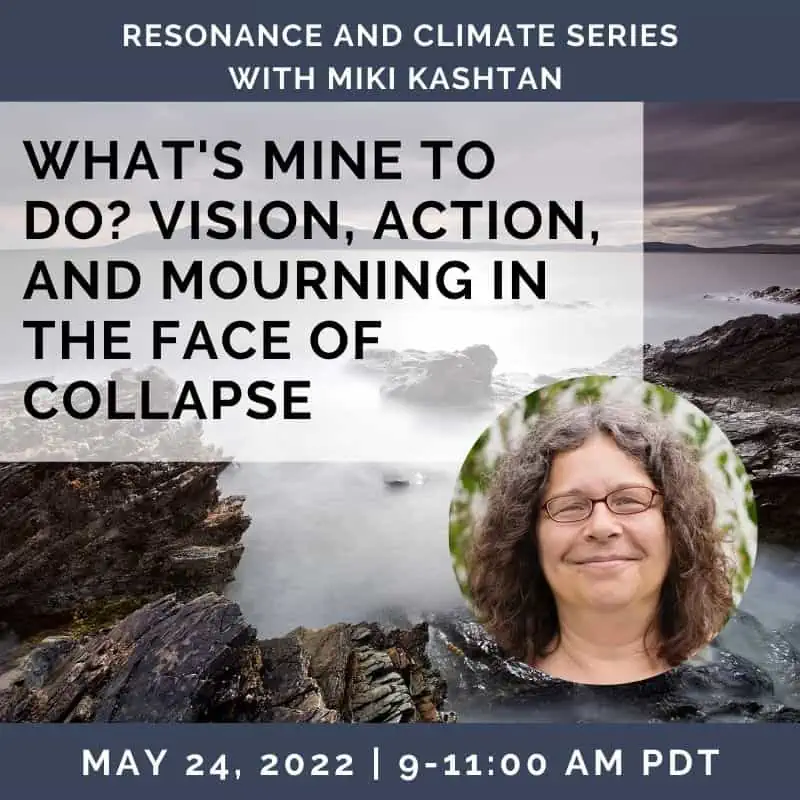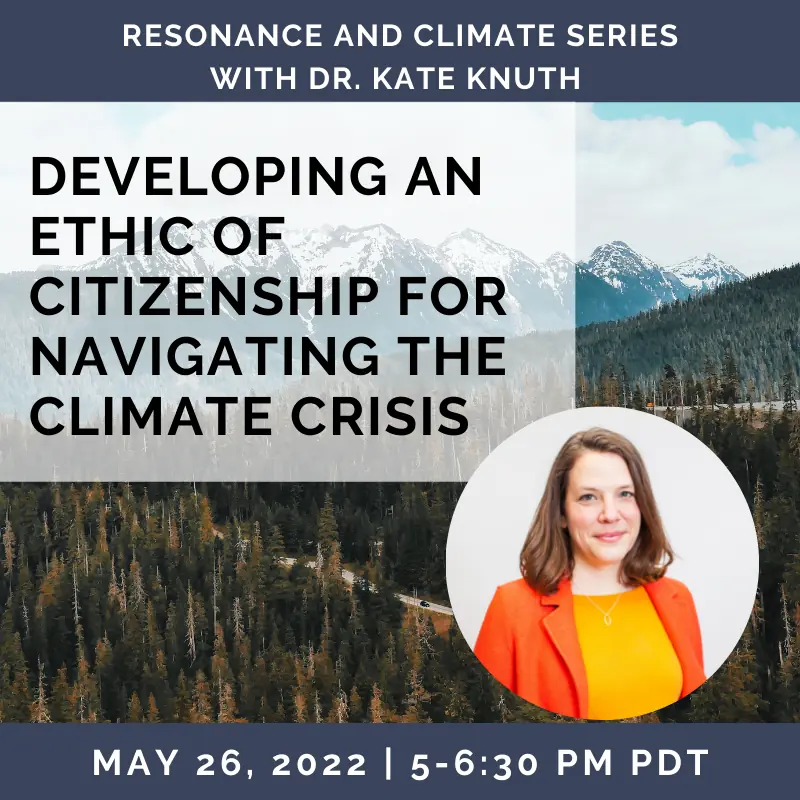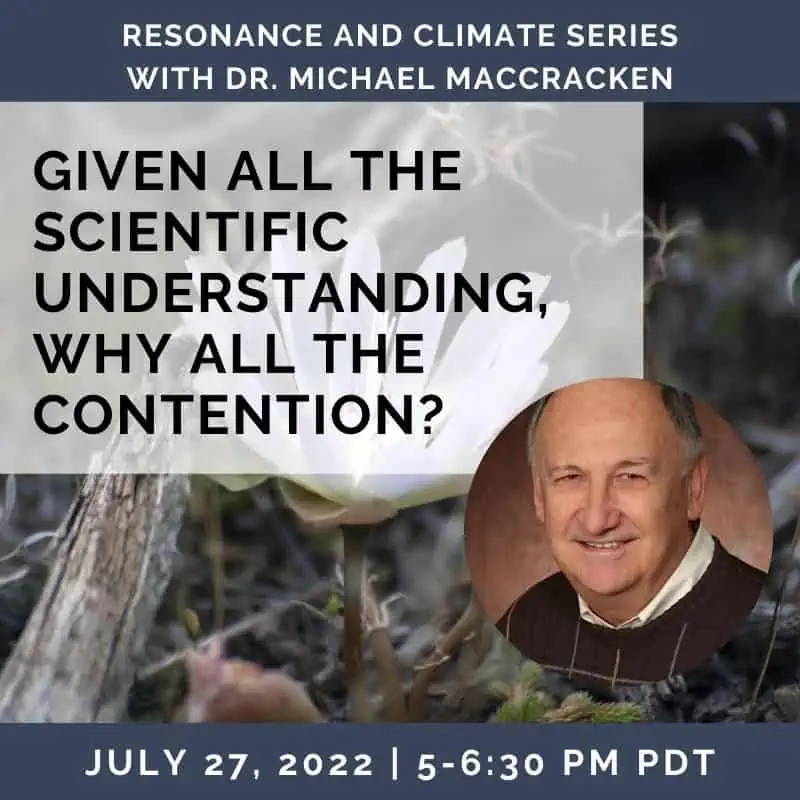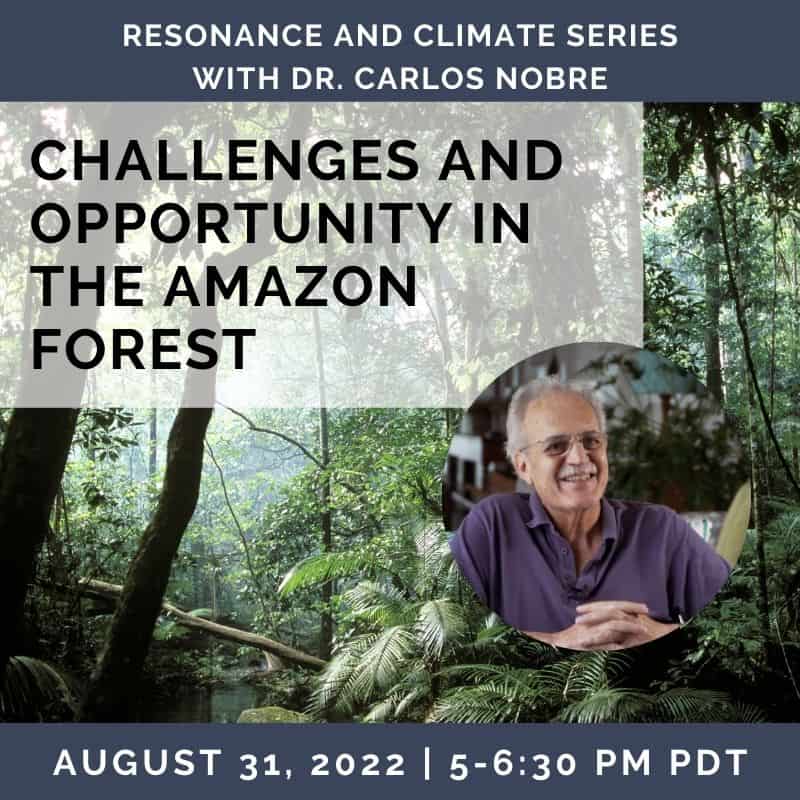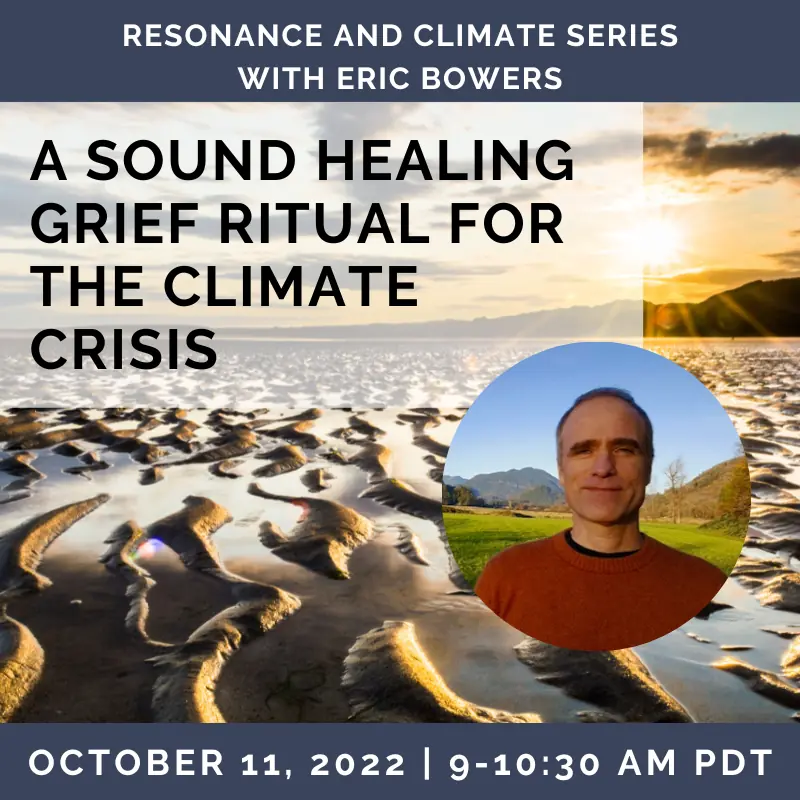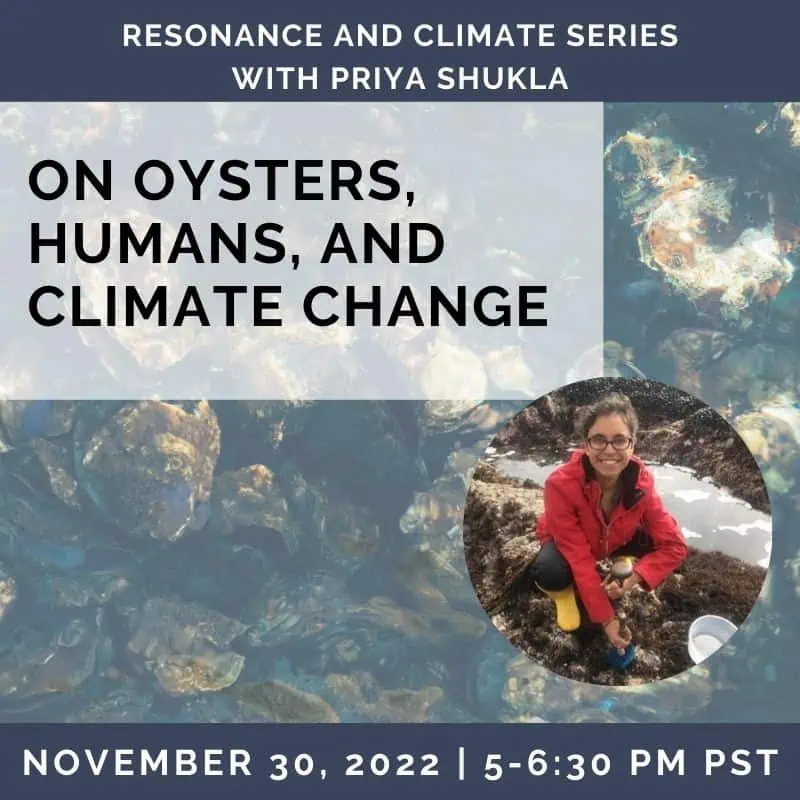The Resonance and Climate Series
Join Sarah and 24 special guests for a 12-month learning community to build understanding, resiliency and togetherness amidst the ecological crisis we and our planet are facing.
Climate Science for the World’s Worry: a 12-month Series
Do you make efforts to comprehend the uncountable impacts of the climate crisis on our beloved earth, and does your mind boggle? Do you worry about the future? Do you struggle with helplessness and overwhelm? Do you sometimes feel so much tenderness for the world that you think you might burst?
You are not alone. This collection of feelings is often called climate anxiety, and it’s happening to people all over the world as we face what’s going on with the overuse of fossil fuels and resulting global temperatures and weather changes, and their impacts on species and ecosystems.
The very best remedy for climate anxiety is knowing that this a collective experience, not an individual experience. We need community, acknowledgement, collective mourning, collective education and collective effort. We need to be able to hold hands and look together. This year Sarah Peyton and The Resonance Institute are putting together a 12-month program to support looking, understanding, staying resilient and taking action together.
This series is offered on a sliding scale to support as many people being able to participate and receive the healing and support of resonance and combat the often lonely experience and alarmed aloneness in the face of the crisis we and our planet are facing.
Sign up for the full series for exclusive access to bonus Resonance sessions with Sarah Peyton. These bonus sessions will be warmly held to support healing, grieving, action, connection and integration.
This online series includes twenty-four workshops with leading climate scientists, psychologists, healers and activists:
Advancing an Intersectional Climate Justice with Dr. Jade S. Sasser
Recorded March 26, 2022 at the Resonance Summit
Climate change is a crisis that unfolds differently for communities along the lines of race, class, gender, sexual orientation, and other aspects of identity. How can we create the climate futures we want by placing marginalized communities at the center? What role does justice play in that process?
In this keynote, Dr. Sasser explores diverse youth climate activism, the Sunrise Movement, Movement Generation, climate strikers and others, paying particular attention to anti-racist, anti-capitalist, justice-centered approaches. The presentation also thinks through how emotional and mental health support can effectively be centered in an intersectional climate justice approach. Jade argues for creatively drawing on science, art, and racial justice movements as blueprints for imagining and creating hopeful, just climate futures.
Perspectives and Practices for an Eco-Wise Culture with Leslie Davenport
This session highlights key neuroscience research, social psychology perspectives, and an experiential depth practice to support our movement toward embodying a more complete experience of our humanity that is viscerally and consciously connected to our place in the living biosphere. Moving toward a mature planetary civilization includes activating our intuitive, creative, somatic, relational, ancestral, environmental, and emotional intelligences. By restoring our relationship with the part of our interior landscapes and ways of knowing that have been cut off or become dormant because of the predominant Western mindset, we can collectively contribute to an evolutionary impulse toward an eco-wise shift.
Registration after the live event includes access to the recording, chat, transcript and any other materials provided by the presenter
Contribution of Large Animals to Help Fight Climate Change with Dr. Fabio Berzaghi
Dr. Fabio Berzaghi presents on the contribution of large (and small) animals that help fight climate change and keep ecosystems healthy. He also shares about Rebalance Earth, an amazing startup made of volunteers with a vision of contributing to positive change in the world by protecting nature and helping local communities. His work on African forest elephants has been covered widely by global press outlets including The NY Times, including his conversation with Ralph Chami from the International Monetary Fund.
Registration after the live event includes access to the recording, chat, transcript and any other materials provided by the presenter.
Introduction to Resonance for Climate Anxiety with Sarah Peyton
As our planet suffers, our anxiety increases. We are a part of the whole, and our bodies suffer along with our home. In order to remain engaged, responsive and loving, we need support, otherwise, our inner resources become depleted.
In this introduction, participants will begin to:
- learn about the importance of naming emotions in order to be able bear the big picture
- discover the 8 circuits of emotion and motivation
- explore the connection between the circuits and feeling words, both definite and indefinite
- practice linking feelings with needs
- understand the link between trauma, blown emotional fuses and being able/not being able to consider the climate crisis
- experience the relief that comes with resonance
Join Sarah Peyton to learn about resonance at times of uncertainty and crisis. Gain resilience, a sense of connection and a path toward action.
If you enjoy this session and want to join Sarah for a deeper dive into resonance for climate anxiety and benefit from the 10 2-hour bonus sessions included in the full series exploring this material. You can sign up here (plus get access to all 25 guest speaker’s presentations!)
Registration after the live event includes access to the recording, chat, transcript and any other materials provided by Sarah
What’s Mine to Do? Vision, Action, and Mourning in the Face of Collapse with Miki Kashtan
We live in difficult times, with overwhelming challenges affecting all of life on planet Earth. Against all odds, some of us lift up our heads above the grind to mobilize our resources to respond to intensifying climatic, political, and cultural crises. How do we nourish our capacity to do the work? With enough of three things.
Vision maintains the faith that something else is possible.
Action deepens our sense of agency and capacity to contribute.
Mourning helps us be with the gap between our vision and what we see around us and realigns us with the flow of life.
When we know what is ours to do and what is not, we can discern our next steps with care for all the needs, impacts, and resources we know of, including the limits of our capacity.
With enough support, this can lead to more capacity to stay the course without burnout.
Registration after the live event include access to the recording, chat, transcript and any other materials provided by the presenter.
Developing an Ethic of Citizenship for Navigating the Climate Crisis with Dr. Kate Knuth
The climate crisis is undermining democracy just at the time we need it most. We need a strengthened ability to govern together, across divides, in order to forge our path toward a more just, sustainable future.
In this talk, Dr. Kate Knuth develops the idea that an ethic and practice of citizenship capable of responding to the climate crisis will help us as individuals and society thrive in our time. She discusses how the climate crisis creates new challenges for citizenship and offer practical ideas for developing a practice of citizenship in the climate change era.
Registration after the live event include access to the recording, chat, transcript and any other materials provided by the presenter.
How “Generation Dread” Can Emerge From Chronic Eco-Distress With Resilience with Dr. Britt Wray
Dr. Britt Wray unpacks themes and major lessons she learned from writing her new book, Generation Dread: Finding Purpose in an Age of Climate Crisis. Through memoir, reportage and narrative non-fiction, Generation Dread examines wide raging mental health impacts of the ecological crisis, creative coping strategies for living more comfortably amidst profound eco-distress, what can be done to exercise flexible thinking about the future, and why we ought to be aware of psychological defences that prevent action.
Registration after the live event includes access to the recording, chat, transcript and any other materials provided by the presenter.
Water and Soil Conservation in Agriculture With Dr. Mallika Nocco
Online, June 30, 2022 5-6:30 pm Pacific Time (convert to your time zone here)
Diverse groups of people need to anticipate outcomes and return-on-investment from different conservation strategies to manage soil and water in a changing climate. Additionally, communities greatly benefit from extension and decision support tools to help make soil and water management decisions during and in preparation for drought. This seminar presents new approaches for soil and water conservation in different crops across California and the Midwest US.
Repair And Care In A Ruptured World: Psychology Tends to The Climate Crisis with Dr. Wendy Greenspun
In this workshop, Dr. Wendy Greenspun outlines the various ruptures that are both embedded in and contributing to the unfolding climate and environmental crisis. These ruptures include the internal defense mechanism of disavowal that leads us to split off our full awareness of climate disruption, the fractures between groups of people including various forms of polarization, marginalization and othering, and the split between humans and the more-than-human world characteristic of the modern Western world. Like Kintsugi, the Japanese pottery tradition that mends broken shards with golden lacquer, movements toward repair of these various ruptures can create stronger ‘containers’ for the pain of individuals and communities and help us move toward essential action. Considerations of forms of care and repair will be elucidated through experiential exercises and discussion.
Registration after the live event includes access to the recording, chat, transcript and any other materials provided by the presenter
Given All the Scientific Understanding, Why All the Contention? with Dr. Michael MacCracken
While the scientific community has come to unprecedented international scientific agreement on the causes of climate change and what needs to be done to stop it, there remains significant contention about the issue. At least part of the reason for this is the different decision-making frameworks of those involved in the decision-making and a seeming failure for widely respected figures to coalesce the disparate voices around a vision of the future that we can work toward while also valuing the past contributions of fossil fuel and providing a safety net for those who have worked so hard in that effort.
Registration after the live event includes access to the recording, chat, transcript and any other materials provided by the presenter
Finding our Right Place on the Planet and Earth’s Extended Family with Francesca Mason Boring
Family Systems Constellation has demonstrated to us the deep peace and sense of balance that comes from finding our right place in the family system. The anxieties and imbalance that are prolific with modernity lead us to the natural place of remembering that we have a right place in relationship to our Mother Earth as well.
What has your family system taught you about your relationship to the Earth? Who came first? A short introduction to this workshop, a breakout group to ground participation and a constellation will provide our Circle with an invitation from the knowing field to begin to walk in right relationship with the earth and to remember that we are carried and a part of the system of nature.
Registration after the live event includes access to the recording, chat, transcript and any other materials provided by the presenter.
Challenges and Opportunity in the Amazon Forest with Dr. Carlos Nobre
Dr. Nobre will discuss how close the Amazon forest is to a tipping point of “savannization” and the consequences of that for the maintenance of the largest tropical rainforest. He will also address the challenges of creating a sustainable ‘standing forest-flowing rivers’ bioeconomy, bringing about nature and community-based solutions.
Registration after the live event includes access to the recording, chat, transcript and any other materials provided by the presenter.
Turning What We Know Into What We Do with Dr. Lise Van Susteren
In this day of tumultuous breaking news, Lise Van Susteren knows how to calm us down – by helping us identify and unpack our reactor types and foster better relationships by showing us how to better understand each other.
Hidden in plain sight but not always in our consciousness, she shares a menu of natural remedies we can use to restore our emotional equilibrium. And weaving in the latest in 21st Century neuroscience – she will share the essentially untold story of why, as we seek to address social justice issues while finding purpose to define our lives, going from being a bystander to an upstander has proved to be the “magic sauce.”
What Atmospheric Rivers Can Teach Us About Ourselves & the Path Forward With Dr. Katerina Gonzales
When it rains it pours. Drawing on lessons from her research of atmospheric rivers–rivers in the sky–Dr. Katerina Gonzales will share reflections on the atmospheric and climatic conditions that not only change the water cycle, but change who we become. With an eye towards change and transformation, we will reflect on the journeys that these sky rivers take and what they have to teach us about responding to the climate crisis within ourselves and in community.
Registration after the live event includes access to the recording, chat, transcript and any other materials provided by the presenter.
A Sound Healing Grief Ritual for the Climate Crisis with Eric Bowers
This session is an opportunity to come together and grieve the losses and devastation that are happening due to climate crisis. When we don’t have support and space to grieve significant losses, the grief stays stuck inside us and takes a toll on our mental and physical health. Blocked grief can also compromise our capacity to take effective action.
Join Eric Bowers for space to grieve in community. Before the sound healing begins, Eric will suggest different ways to use your breath, voice, and body to open up and move through grief and other emotions that are stuck in your body.
Registration after the live event includes access to the recording, chat, transcript and any other materials provided by the presenter.
Scientist Stories: From Coral Reefs to Arctic and Antarctic Poles with Dr. Suchana Chavanich
Dr. Suchana Chavanich, professor at Chulalongkorn University, Bangkok, Thailand, in the Department of Marine Science, will speak about why we have to conserve marine ecosystems, and what are the current threats. She will share about her efforts at coral reef protection working with the first group in Thailand to succeed in mass coral culture using sexual reproduction techniques. Chavanich will also tell the story of what she has seen in the field, from the tropics to the Arctic and Antarctic poles, in our changing world.
‘Climate-Aware’ Therapy to Navigate Climate and Ecological Crisis with Caroline Hickman
Online, October 31, 5-6:30 pm Pacific Time (convert to your time zone here)
Encounters with the climate and ecological crisis in the therapeutic space may be seen as overt, subtle, symbolic; personal, collective, social and global experiences. Caroline Hickman will discuss developing a climate & bio-diversity crisis lens through which therapy can respond to these emerging concerns as well as how dreams and the imaginal are increasingly revealing what is under the surface of people’s climate distress.
We will examine a range of approaches we can use in the therapy room, at home, in school and outdoors to support clients to explore their thoughts, feelings and dreams about the climate and biodiversity crisis. We will look at a range of practical and imaginal approaches including art, storytelling, play and personification, and explore climate-aware therapy including the move from therapeutic dyad (between therapist & client) to the therapeutic triad (between therapist, client, and the planet).
The Gift of Grief: Ecological Grief in an Era of Loss and Damage with Dr. Ashlee Cunsolo
We are living in an era of unprecedented destruction and degradation of ecosystems and species, characterized by ongoing, enduring, and cascading loss and grief. While painful and often isolating, ecological grief is a reasonable, rational, and essential response to the climate crisis that reminds us that we are inextricably interlinked with humans and more-than-humans, and that the personal and the planetary are inseparable.
Drawing from 14 years of working with people on the frontlines of climate change, and interweaving personal experiences with leading global research, Dr. Ashlee Cunsolo delves into diverse expressions of ecological grief and loss, and explores how the ‘gift of grief’ and ‘gritty hope’ can foster deeper relational connections with humans and more-than-humans, and furnish new ethical and political communities. We need not carry our planetary pain and sorrow in isolation; instead, we can mobilize our grief for collective-building, for activism, and for personal and planetary healing.
Registration after the live event includes access to the recording, chat, transcript and slides provided by the presenter.
On Oysters, Humans, and Climate Change with Priya Shukla
Priya Shukla discusses the relationship between humanity, the food we fetch from the sea, the role of oysters in our ecosystems and diets, and how climate change hangs over it all. In coastal California, natural oyster reefs are few and far between, while oyster farms are economic engines and anchors in many rural communities. This is particularly true in Tomales Bay, which is considered the heart of California’s oyster industry. In addition to providing luxe oysters for human consumption, they are also beginning to use their resources to help restore the oyster reefs that once existed where their oyster baskets are now. Join Priya to learn about what it means to do science to help climate-proof an industry that provides infrastructure to a community and may also play a pivotal role in bringing back the oysters that preceded them.
Registration after the live event includes access to the recording, chat, transcript and any other materials provided by the presenter.
Getting to the Heart of Climate and Science Communication with Faith Kearns
Many climate scientists and communicators find themselves working on issues that are emotional, contentious, and sometimes traumatic. The traditional science communication tools of perfecting a presentation, message, or frame fall short in the face of these kinds of challenges. This talk focuses on a different way of approaching climate science communication with tools that including relating, listening, working with conflict, and understanding trauma, all with an eye toward justice and community care as covered in Kearns’ recent book, Getting to the Heart of Science Communication (Island Press, 2021).
Registration after the live event includes access to the recording, chat, transcript and any other materials provided by the presenter.
Building Agricultural Resilience From The Ground Up with Dr. Aidee Guzman
In this talk, Guzman presents her research on how on-farm diversification in an intensively managed landscape can bolster below- to above-ground biodiversity and their interactions on agroecosystems. For this work, Guzman partnered with small-scale farmers implementing diversified farming practices (e.g. increasing crop diversity) but are often invisibilized in the monoculture landscape of California’s San Joaquin Valley. Guzman shares research on how crop diversification can support soil health (i.e. via beneficial microbes), pollinator communities (i.e. wild bees), and their interactions. She also discusses how sociopolitical barriers may attenuate the adaptive capacity of small-scale farmers of color to ecological stressors.
Registration after the live event includes access to the recording, chat, transcript and any other materials provided by the presenter.
Psychological Roots of the Climate Crisis: The Culture of Uncare with Sally Weintrobe
Registration after the live event includes access to the recording, chat, transcript and any other materials provided by the presenter.
Sally Weintrobe, psychoanalyst and author, discusses issues she presents in her book, Psychological Roots of the Climate Crisis, which tells the story of a fundamental fight between a caring and an uncaring imagination. Her book helps us to recognise the uncaring imagination in politics, in culture — and also in ourselves. Sally Weintrobe argues that achieving the shift to greater care requires us to stop colluding with the rigid psychological mindset largely responsible for the climate crisis. People in this mindset believe that they are entitled to have the lion’s share and that they can ‘rearrange’ reality with magical omnipotent thinking whenever reality limits these felt entitlements. Weintrobe shares her experience as a psychoanalyst, from her professional life that has been dedicated to helping people to face difficult truths.
Local To Global Impacts Of A Thawing Arctic with Darcy Peter and Dr. Susan Natali
Registration after the live event includes access to the recording, chat, transcript and any other materials provided by the presenter.
Dr. Sue Natali and Darcy Peter co-present on the impacts of climate change and permafrost thaw in Arctic and sub-Arctic Indigenous communities in Alaska and the global implications of permafrost thaw across the Arctic on the Earth’s climate. They offer different perspectives for what climate change looks like in the Arctic and how this connects with global communities.
The Story Behind A Scientist’s Warning Of An Environmental And Climate Crisis with Dr. William Ripple
Dr. Ripple is our last scientist speaker for the Resonance & Climate Change series. Distinguished Professor of Ecology; Richardson Chair; and Director, Trophic Cascades Program at Oregon State University, Ripple speaks about our current climate crisis, his “2nd Warning Letter to Humanity,” which has over 15,000 scientist signatures and his paper “World Scientists’ Warning of a Climate Emergency.” Ripple and colleagues advocate massive-scale mobilization to address the climate crisis, including much more progress on the six steps of climate change mitigation – in areas of energy, short-lived pollutants, nature, food, economy, and population.
The Psychological Insights to Unlock Action on Global Climate Crises with Renée Lertzman and Sarah Peyton
Online, March 20, 2023 5-6:30 pm Pacific Time (convert to your time zone here)
Join Dr. Renée Lertzman and Sarah Peyton for a brief overview of Renee’s stunning work in the world of Climate Crisis Psychology and Action. Renee will bring the power of her TED Talk on this theme, which has over two million views, to this conversation about self-compassion, the importance of knowing how we feel, what blocks us from taking action, and how to move forward.
“Understanding the need for resonance and accompaniment is key to being with the hugeness, the massive grief and overwhelm, of truly holding planetary suffering.”
– Sarah Peyton
The Series includes exclusive resonant support and integration sessions with Sarah Peyton:
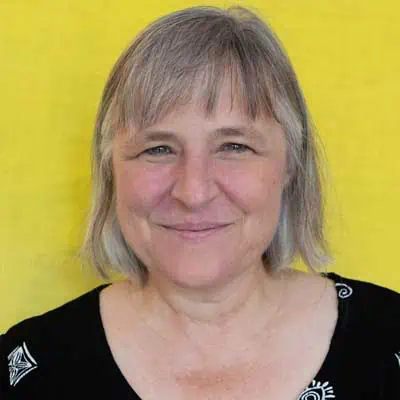
10 Live 2-Hour Resonant Support and Integration Sessions with Sarah Peyton:
April 26, 9-11 AM PDT | June 21, 9-11 AM PDT | July 27, 9-11AM PDT | Aug 24, 9-11 AM PDT | Sept 27, 9-11 AM PDT | Nov 1, 9-11 AM PDT | Nov 29, 8-10 AM PST | Dec 13, 9-11 AM PST | Jan 30, 2023 5-7 PM PST & Feb 21 2023, 9-11 AM PST
Sarah’s integration and resonance sessions are a participatory, body-centered exploration that supports us to be with the emotions that arise when encountering this material. Sarah will offer resonant language and unconscious contract work that helps us be with ourselves and each other in the hugeness, the massive grief and overwhelm, of truly holding planetary suffering. These sessions will support healing, grieving, action and connection. We can only do this together.
Over the year, participants will:
– learn and practice the 9 Resonant Language skills in relationship to climate anxiety
– experience a deepening connection with the body and an expanded ability to bring words to emotions
– respond to the emotions that come up in response to the different presenters
– address the scale of grief that the losses that the climate crisis and these extinction events call for
– and simultaneously make room for the joy of the present moment to still exist
Cost and How to Register
This series is offered on a sliding scale to support as many people being able to participate and receive the healing and support of resonance and combat the often lonely experience and alarmed aloneness in the face of the crisis we and our planet are facing. Select your amount of payment below in the drop-down.
Any of the 26 workshops in this series can be purchased individually, but purchasing the full series includes monthly resonance and integration sessions with Sarah* (10 total!) to learn and practice resonance skills and nurture community. * This exclusive bonus is only available for those who sign up for the full series *
If you have questions or need help deciding whether this event is right for you, please email [email protected]
Do you make efforts to comprehend the uncountable impacts of the climate crisis on our beloved earth, and does your mind boggle? Do you worry about the future? Do you struggle with helplessness and overwhelm? Do you sometimes feel so much tenderness for the world that you think you might burst?
You are not alone. This collection of feelings is often called climate anxiety, and it’s happening to people all over the world as we face what’s going on with the overuse of fossil fuels and resulting global temperatures and weather changes, and their impacts on species and ecosystems.
The very best remedy for climate anxiety is knowing that this a collective experience, not an individual experience. We need community, acknowledgement, collective mourning, collective education and collective effort. We need to be able to hold hands and look together. This year Sarah Peyton and The Resonance Institute are putting together a 12-month program to support looking, understanding, staying resilient and taking action together.
This series is offered on a sliding scale to support as many people being able to participate and receive the healing and support of resonance and combat the often lonely experience and alarmed aloneness in the face of the crisis we and our planet are facing.
Sign up for the full series for exclusive access to bonus Resonance sessions with Sarah Peyton. These bonus sessions will be warmly held to support healing, grieving, action, connection and integration.
$350.00 – $2,000.00
About Sarah
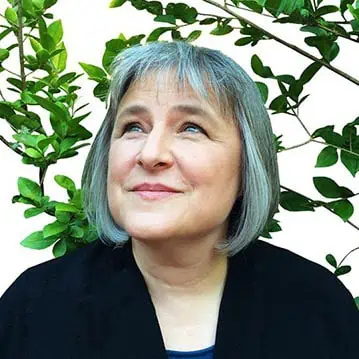
Sarah Peyton, Certified Trainer of Nonviolent Communication and neuroscience educator, integrates brain science and the use of resonant language to heal personal and collective trauma with exquisite gentleness.
Sarah is a sought-after expert who brings neuroscience expertise together with depth work, self-compassion, and the transformative potential of language. She works with audiences internationally to create a compassionate understanding of the effects of relational trauma on the brain, and teaches people how words change and heal us.
Sarah teaches and lectures internationally and is the author of three books: Your Resonant Self: Guided Meditations and Exercises to Engage Your Brain’s Capacity for Healing, the companion Your Resonant Self Workbook: From Self-sabotage to Self-care, and Affirmations for Turbulent Times: Resonant Words to Soothe Body and Mind.





